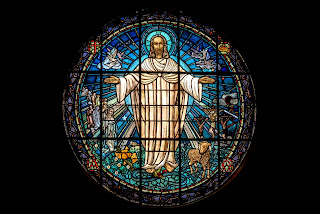The disciples and people of Jesus day were taught that the Messiah would be like a conquering king like Solomon that would free them from the rule of the Romans and establish Israel as a great kingdom. That is what they were expecting. I really think that is what attracted Judas Iscariot in the first place. He was the treasurer of the disciples money in Jesus' day and probably had hopes that he would be put in charge of the entire kingdom's money when Jesus came into power (John 12:6). He was expecting a conquering king because of some of the Old Testament language that refers to Jesus as a king, but he didn't understand God's timing or plan.
Jesus himself affirmed that he is a king. In John 18:36 it says that Jesus said "My kingdom is not of this world. If My kingdom were of this world, then My servants would be fighting, that I might not be delivered up to the Jews; but as it is, My kingdom is not of this realm." If you notice how many times in Matthew alone the kingdom of heaven is mentioned. Jesus was trying to teach people that his kingdom was not like what they anticipated. He did this in the triumphant entry also mentioned in Mark 11 when he came riding into town on a young donkey instead of a white stallion like a king of this world would. Yet, Jesus riding on a donkey was a exact fulfillment of Zechariah 9:9. But, it seems they missed the because they saw what they wanted to see instead.
Prophesy can be confusing like that. I would compare it to looking at a line of mountains on the horizon. From our vantage point, it appears that the mountains are all close together, but as you get closer you realize there are great valleys between them. To make it more difficult there are verses that start talking about an earlier time and then rush forward to the future without so much as a comma between thousands of years of time. An example of this is in Isaiah 14 when the beginning of the chapter references Babylon, but then verses 12-15 specifically mention Satan. The shift is so slight that if your not paying attention you may miss it.
So difficult for them to understand this that the suffering servant mentioned in Isaiah 53 that is "crushed for our iniquities" was thought to be someone separate from the Messiah since they could not imagine someone doing both. Or passages like Psalm 22:6 where the Messiah or suffering servant is mentioned as a reproach of men and despised by the people.
That is why in Mark 8:31-33 when Jesus begins to talk quite bluntly about his death and resurrection Peter rebukes him. He doesn't yet understand the kind of kingdom that Jesus came to introduce. He doesn't understand that Jesus came to be a substitutionary sacrifice for our sins to rescue us from the domain of darkness as mentioned in Colossians 1:13.
Look in Mark 8:31-33:
31 And He began to teach them that the Son of Man must suffer many things, and be rejected by the elders and chief priests and scribes, and be killed, and after three days rise again. 32 He spoke this word openly. Then Peter took Him aside and began to rebuke Him. 33 But when He had turned around and looked at His disciples, He rebuked Peter, saying, “Get behind Me, Satan! For you are not [a]mindful of the things of God, but the things of men.”
Peter is finding out here that his plans and God's are not the same and that the death and resurrection of Christ though very difficult for them to fathom at that point is a part of the plan. It is why Jesus mentioned very plainly from this point on that he would be killed and resurrected. See for example Mark 9:31-32, 10:33-34 Interestingly, it says that the disciples did not understand and were afraid to ask him about it. Peter perhaps did not yet fully understand that man is utter helpless to save himself. In Romans 5:6 it says that "For while we were still helpless, at the right time Christ died for the ungodly."
I don't think we should be surprised when God does things we don't understand. God is infinite and we are finite and just by the nature of who we are and who he is there are going to be times when I don't understand Him. There has to be an element of mystery to God and that is why faith is required because we will never be able to box God in completely. In Isaiah 55:8-9 the Lord says that His thoughts are not our thoughts and his ways are not our ways and that the heavens are higher than earth just as his ways are higher than ours. That means that his ways are infinitely higher than ours. This should be something that encourages us rather than disheartens us because God is able to do more than we can ask or imagine.

